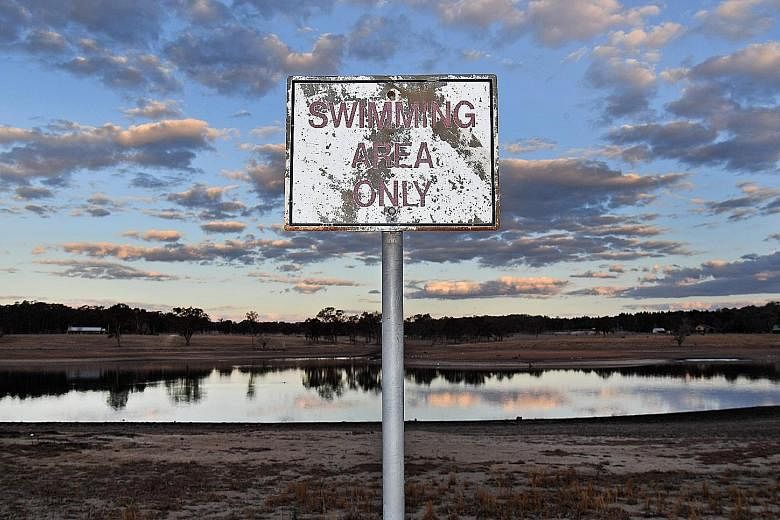Australia is in the grip of a severe drought that has crippled farmers and left entire towns without water, and the effects are now spreading to major population centres such as Sydney.
This week, the five million residents of Sydney, the capital of New South Wales state, faced level-two water restrictions for the first time since 2003.
The restrictions, which took effect on Tuesday, include a ban on hosing gardens and limits on filling swimming pools. In addition, cars can be washed only with a bucket and gardens must be watered either before 10am or after 4pm. Individuals who breach the rules face a fine of A$220 (S$205).
Residents seem to have accepted the restrictions with little objection. Many are aware that their fellow Australians in areas hit by prolonged drought or bush fires are enduring much harsher conditions brought about by a warming planet.
Ms Tanya Lazarou told The Sydney Morning Herald this week that she had been teaching her four-year-old son about the need to conserve water, including not playing with taps at the local park.
"I'm teaching him that the farmers haven't got water and he needs to be conscious of how much he turns the tap on, and how much he really needs," she said.
The restrictions follow a serious drought which had reduced dam levels around the city to 44.7 per cent as of yesterday, down from 46.7 per cent a month earlier and 61 per cent a year ago.
About 85 per cent of Sydney's water supply depends on rainfall captured by dams. The remainder is from the city's desalination plant, which was switched on in January as dam levels fell.
The New South Wales government is exploring other sources of water such as recycled water, which can be used to water public parks and gardens.
The government is also set to increase the capacity of the desalination plant, which can now produce 250 million litres a day, which is 15 per cent of Sydney's supply.
The run of dry weather in recent years has led to restrictions in water catchment zones across various states, particularly in the country's east and south-east. Some areas are at level-five or six restrictions, and this could rise to level eight.
In the town of Orange in New South Wales, for instance, gardens can be watered only on Sundays from 6pm to 7pm, and residents are urged to restrict showers to a maximum of three minutes.
Some 370km north-east, in the town of Murrurundi, which is on level-6 restrictions and relies on trucked-in water, resident Ron Ferguson said it was "very testing".
"I took it for granted for a long time that you turn the tap on and it just keeps running... but when you see how long this drought drags on, that tap's drying up pretty quickly," he told Channel Nine.
Australia's long run of hot, dry weather has taken a harsh toll on farmers and led to devastating bush fires, which continue to burn in parts of the country. Across Australia, water storage levels are at 48 per cent capacity, down from 55 per cent a year ago.
A report by the Bureau of Meteorology, released on Dec 2, found that this year's spring was the driest on record. And average maximum temperatures since January have been the hottest on record.
Experts say Australia will become even drier as the climate changes and that more lasting measures will be required, such as greater use of recycled water.
Dr Petr Matous from the University of Sydney said governments should improve recycled water infrastructure as well as encourage conservation and public awareness of the costs of usage, particularly in Sydney.
"Most of us in Sydney don't even know how much water we use, unlike people in other cities whose water bills depend on their actual consumption, or people in remote areas who live off their rainwater tanks," he wrote in a bulletin earlier this year.

